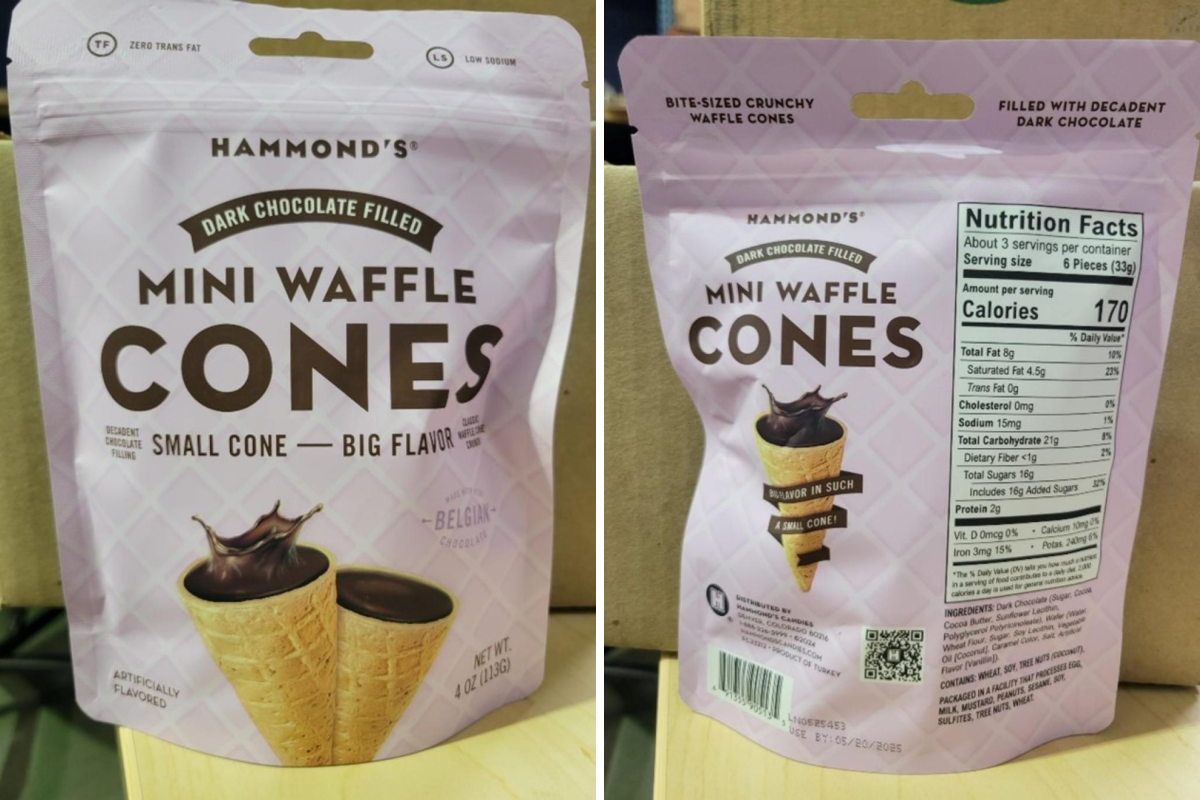Hammond’s Candies’ chocolate-filled waffle cones have been given the second-highest risk level by the U.S. Food and Drug Administration (FDA) after a consumer suffered an allergic reaction to the product.
Colorado-based Hammond’s Candies initiated the recall on August 30 after a consumer reported reacting to milk in the products, which were labelled as not containing the allergen.
The “Dark Chocolate Filled Mini Waffle Cones” label declared that allergens included “wheat, soy, tree nuts (coconut)” and that the product was “packaged in a facility that processes egg, milk, mustard, peanuts, sesame, soy, sulfites, tree nuts, wheat.”
Testing carried out by Hammond’s Candies have since found more than trace amounts of milk in the products, so milk should have been declared as an allergen on the packets.

FDA / Canva
As of November 1, the FDA has given the recall as “Class II” risk level, which its website describes as “a situation in which use of or exposure to a violative product may cause temporary or medically reversible adverse health consequences or where the probability of serious adverse health consequences is remote.”
The desserts were sold in 38 states—Alabama, Arkansas, Arizona, California, Colorado, Delaware, Florida, Georgia, Iowa, Illinois, Indiana, Kansas, Kentucky, Massachusetts, Maryland, Michigan, Minnesota, Missouri, Montana, North Carolina, New Hampshire, New Jersey, New Mexico, Nevada, New York, Oklahoma, Oregon, South Carolina, South Dakota, Tennessee, Texas, Utah, Virginia, Vermont, Washington, Wisconsin, West Virginia and Wyoming—and in Washington D.C.
Hammond’s Candies are recalling nearly 30,000 units of the desserts, which are packaged in 4oz stand-up resealable pouches and bear the product code “6 91355 90513 5.”
Affected products have one of three lot numbers: “LN0525453,” “LN0524629,” or “LN0525155.”
Packets with the first lot number subject to recall have “use by” dates ranging from October 3, 2024 to May 20, 2025.
Recalled desserts with the second lot number have “use by” dates of either November 14, 2024, or December 14, 2024.
And, with the third lot number, affected packets have “use by” dates of January 1, 2025, January 7, 2025, or March 1, 2025.
No further allergic reactions have been reported by the FDA, and Hammond’s Candies’ investigation into the cause of milk getting into the waffle cones was ongoing, as of last month.
Consumers who have purchased recalled Hammond’s waffle cones are being urged to return them for a refund.
Newsweek has approached Hammond’s Candies for comment via email.
Milk is one of the eight foods that accounts for the most serious allergic reactions in the U.S., according to the Centers for Disease Control and Prevention, along with eggs, fish, crustacean shellfish, wheat, soy, peanuts and tree nuts.
Allergic reactions to milk are immune responses to proteins—whey and casein—in the milk, unlike lactose intolerance reactions which produce gut symptoms such as bloating, diarrhea, constipation and abdominal cramping.
Symptoms may appear within minutes, or may take up to three days to appear, and usually include some of the following: itchiness of the mouth, tongue or throat; swelling of the lips and face; an itchy rash; digestive complaints such as vomiting, nausea, abdominal pain and diarrhea; a runny nose or sneezing.
In severe cases, an allergic person may have an anaphylactic reaction to milk, involving swelling of the tongue or throat, difficulty breathing, dizziness and loss of consciousness—in which case, adrenaline should be administered by injection, such as with an EpiPen, and 911 should be called immediately.
Other recent recalls include mushrooms potentially contaminated with listeria, salad that may cause allergic reactions and salsa that may contain glass.
Do you have a tip on a food story that Newsweek should be covering? Is there a nutrition concern that’s worrying you? Let us know via science@newsweek.com. We can ask experts for advice, and your story could be featured in Newsweek.
